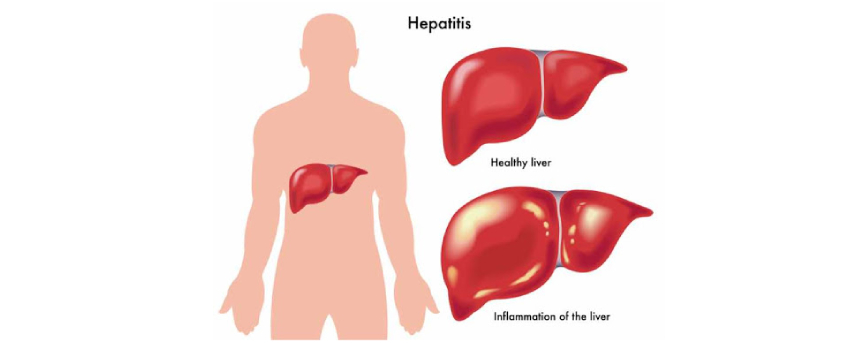The types of hepatitis:
Each of the hepatitis viruses is different, but they all share a target: the liver. The liver performs many vital functions in your body. Many of the liver’s functions involve cleansing blood, fighting infection, and storing energy. Hepatitis threatens the liver’s ability to function.
The main hepatitis viruses fall into five different types: A, B, C, D, and E. The most common typesTrusted Source in the United States are A, B, and C. Hepatitis B and C tend to be more dangerous than hepatitis A. Also, both B and C can be become chronic conditions.
Symptoms
All forms of hepatitis present similar types of symptoms. Possible symptoms include:
- Fever
- Joint pain
- Fatigue
- Nausea
- Loss of appetite
- Vomiting
- Abdominal pain
Other possible symptoms are bowel movements that appear gray in color and jaundice, which is a yellowing of the skin or whites of the eyes.
You may have hepatitis C without being aware of it. The initial infection may commonly be misinterpreted as the flu or not noticed at all.
Prevalence and transmission:
An estimated 2.7 to 3.9 million people across the globe are infected with chronic hepatitis C, according to the center for disease control and prevention (CDC). Hepatitis C is most commonly spread through contact with infected blood. This usually happens by sharing contaminated needles used for injecting drugs. Other less common ways that hepatitis C is transmitted are through sexual contact, birth to a mother with the hepatitis C virus, or a needle stick injury. Chronic hepatitis B affects between 850,000 and 2.2 million trusted Source. This form of hepatitis is also spread by blood-to-blood contact or by sexual contact. It’s most commonly spread by sexual contact between partners and from an infected mother to her child during birth. Needle sharing and needle sticks are less common causes of infection. The virus can be spread by semen and vaginal fluid as well as blood.
Incubation and risk groups:
The average hepatitis C incubation period trusted source is 45 days, but it can range from 14 to 180 days. The average hepatitis B incubation period is 120 days, but it can range from 45 to 160 days.
People who currently or formerly injected drugs are at high risk for hepatitis C. You also may be at risk if you had a blood transfusion before July 1992.
Infants born to infected mothers are a high-risk group for hepatitis B. Others who have a high risk for hepatitis B are sex partners of people with hepatitis B and people with multiple sex partners.
Acute vs. chronic infection:
Doctors distinguish between chronic and acute infection with hepatitis viruses. Acute infection is a short-term condition, lasting under six months. Chronic infection is a long-term condition, lasting more than six months.
Hepatitis B infection can be either acute or chronic. Most people who get acute hepatitis B don’t end up progressing to chronic hepatitis B. By contrast, acute hepatitis C tends to develop into chronic hepatitis C. Approximately 75–85 percent of adults newly infected with hepatitis C develop a chronic infection, according to the CDC trusted source. Others clear the infection.
When you get acute hepatitis C you may or may not have symptoms. Most cases of acute hepatitis C are asymptomatic, meaning people don’t notice the symptoms. Symptoms are only noticeable in 15 percent of cases of acute hepatitis C.
Testing:
A blood test screening can help your doctor determine if you have hepatitis antibodies in your bloodstream.
Further testing is required if hepatitis antibodies are present. Your doctor will determine if the actual virus still resides in your bloodstream. In hepatitis B, your doctor will send a confirmation test to check for the presence of special antibodies or hepatitis B antigen (what antibodies react to). If found, it means you have an active infection. In hepatitis C, the confirmation test is used to look at the amount of hepatitis C RNA in your blood.
It’s possible to have both hepatitis B and C infections at the same time.
Prevention:
You can take a vaccine to prevent hepatitis B. The CDC recommends the vaccine for:
- All infants at birth
- Older children who have not been vaccinated
- Sex partners of those infected
- People with multiple sex partners
- Men who have sex with men
- Injection drug users
- People with an HIV infection
There is no vaccine for hepatitis C. You can attempt to prevent it by not sharing needles or razors with those infected and by using condoms during sex. Condoms are particularly important if you’re having sex with someone you know has hepatitis C.
Treatment:
Your doctor may provide antiviral drugs for either hepatitis B or C. You may also receive treatment designed to protect the liver and provide greater comfort.
A combination of drugs can help clear the hepatitis C virus from your system. The recommended combination depends on the virus genotype.
Your doctor will also advise avoiding alcohol if you have any type of hepatitis. This is to protect your liver from additional damage.
If you have hepatitis C or think you may have hepatitis C, talk to a doctor. For some people, hepatitis C can be completely cured!



